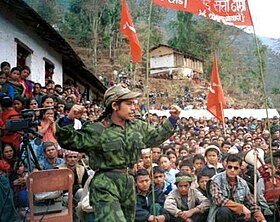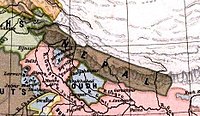
Back الحرب الأهلية النيبالية Arabic Nepal vətəndaş müharibəsi Azerbaijani Грамадзянская вайна ў Непале Byelorussian Guerra Civil del Nepal Catalan Nepálská občanská válka Czech Rhyfel Cartref Nepal Welsh नेपालको जनयुद्ध DTY Enlanda milito en Nepalo Esperanto Guerra civil nepalesa Spanish جنگ داخلی نپال Persian
This article needs additional citations for verification. (May 2015) |
| Nepali Civil War | |||||||
|---|---|---|---|---|---|---|---|
 A Maoist rebel speaks to villagers in the area around Piskar | |||||||
| |||||||
| Belligerents | |||||||
|
Supported by: |
| ||||||
| Commanders and leaders | |||||||
|
Birendra Bir Bikram Shah Dev (1972–2001) Gyanendra Bir Bikram Shah Dev (2001–2008) Sher Bahadur Deuba (1995–1997; 2001–2002; 2004–2005) Lokendra Bahadur Chand (1997–1997; 2002–2003) Surya Bahadur Thapa (1997–1998; 2003–2004) Girija Prasad Koirala (1998–1999; 2000–2001; 2006–2008) Krishna Prasad Bhattarai (1999–2000) Dharmapaal Barsingh Thapa (1995–1999) Prajwalla Shumsher JBR (1999–2003) Pyar Jung Thapa (2003–2006) Rookmangud Katawal (2006–2009) Moti Lal Bohora (1992–1996) Achyut Krishna Kharel (1996–1996; 1996–1999) Dhruba Bahadur Pradhan (1996–1996) Pradip Shumsher J.B.R. (1999–2002) Shyam Bhakta Thapa (2002–2006) Om Bikram Rana (2006–2008) |
(Prachanda) (Pasang) (Badal)[6] (Biplav)[6] | ||||||
| Strength | |||||||
| 95,000 | 50,000 | ||||||
| Casualties and losses | |||||||
| 4,500 killed[7] | 8,200 killed (guerrillas)[7] | ||||||
|
17,800 killed overall[8] 1,300 missing[9] | |||||||
| History of Nepal |
|---|
 |
|
|
| Part of the Politics series |
| Republicanism |
|---|
|
|
The Nepali Civil War was a protracted armed conflict that took place in the former Kingdom of Nepal from 1996 to 2006. It saw countrywide fighting between the Kingdom rulers and the Communist Party of Nepal (Maoist), with the latter making significant use of guerrilla warfare.[10] The conflict began on 13 February 1996, when the CPN (Maoist) initiated an insurgency with the stated purpose of overthrowing the Nepali monarchy and establishing a people's republic; it ended with the signing of the Comprehensive Peace Accord on 21 November 2006.
The civil war was characterized by numerous war crimes and crimes against humanity, including summary executions, massacres, purges, kidnappings, and mass rapes. It resulted in the deaths of over 17,000 people, including civilians, insurgents, and army and police personnel; and the internal displacement of hundreds of thousands of people, mostly throughout rural Nepal. The Truth and Reconciliation Commission has received about 63,000 complaints, as reported by commissioner Madhabi Bhatta, while the Commission for Investigation of Enforced Disappearances has received around 3,000.[11]
- ^ Pradhan, Gyan. "Nepal's civil war and its economic costs" (PDF). Publisher: Center for International and Global Studies, Lindenwood University Press: 118. Archived (PDF) from the original on 25 January 2021. Retrieved 17 September 2020.
{{cite journal}}: Cite journal requires|journal=(help) - ^ "Une polémique éclate en Belgique sur une vente d'armes au Népal". La Croix. 26 August 2002. Archived from the original on 17 November 2019. Retrieved 17 November 2019 – via www.la-croix.com.
- ^ "Chinese Deliver Arms to Nepal 2005". 25 November 2005. Archived from the original on 4 August 2020. Retrieved 7 June 2020.
- ^ a b Miglani, Sanjeev (18 August 2003). "Nepal's Maoist cauldron draws foreign powers closer". Reuters. Archived from the original on 29 May 2018.
- ^ "CCP Maoist support". Archived from the original on 6 September 2020. Retrieved 4 October 2020.
- ^ a b Times, Nepali (15 March 2019). "Biplav is just following the footsteps of mentors". Archived from the original on 25 October 2019. Retrieved 26 October 2019.
- ^ a b Ed Douglas. "Inside Nepal's Revolution". National Geographic Magazine, p. 54, November 2005.
- ^ "17,800 people died during conflict period, says Ministry of Peace – Nepal". ReliefWeb. 18 June 2012. Archived from the original on 5 August 2020. Retrieved 31 January 2020.
- ^ "ICMP Nepal". www.icmp.int. Archived from the original on 18 April 2019. Retrieved 31 January 2020.
- ^ "Truth and Reconciliation Commission, Nepal". Archived from the original on 28 October 2020. Retrieved 28 November 2020.
- ^ "'At least three more years needed to complete task'- Roshan S Nepal's Oped on Transitional Justice". nepalmonitor.org. Archived from the original on 2 September 2021. Retrieved 28 November 2020.
© MMXXIII Rich X Search. We shall prevail. All rights reserved. Rich X Search